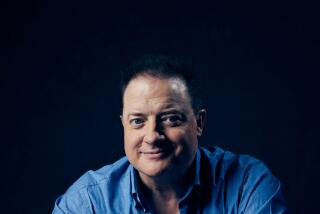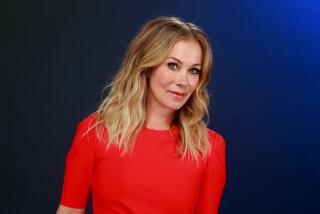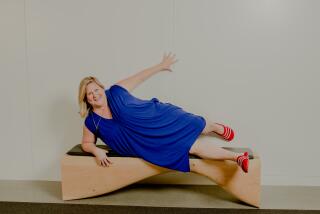Heroic roles for women are a super step forward
Action heroines, super or otherwise, used to be rare on television. Sure, there was an occasional Woman — Police, Wonder, Bionic. Then a few Angels. A warrior princess. They weren’t the most complex characters, until “Buffy the Vampire Slayer” came along, the show’s title and character name belying the depth of each.
These days, just about every network offers an array of women who fight with every super facet of themselves. Priyanka Chopra of ABC’s “Quantico” won the People’s Choice Award for favorite actress, NBC’s “Blindspot,” starring Jaimie Alexander, is one of the season’s biggest hits and Caitriona Balfe found a strong, complicated character in the Starz time-traveling epic “Outlander.”
And now another barrier is being smashed: the superhero culture.
CBS offered “Supergirl” (starring Melissa Benoist) -- before it recently moved to the CW -- as a caped crusader show for the whole family, while Marvel TV employs a battalion of women, including Karen Page (Deborah Ann Woll) in “Daredevil” and a slew of warriors in “Marvel’s Agents of S.H.I.E.L.D.”
“It’s important to us when we’re presenting female role models that it goes beyond whether or not they can kick butt, it’s also that they have a wide variety of skills and abilities,” says Jeph Loeb, head of Marvel TV. A S.H.I.E.L.D. agent like Melinda May (Ming-Na Wen) isn’t just a great fighter, she’s a great leader. “That’s really what makes them aspirational for us.”
They move well from supporting roles to the spotlight. “Marvel’s Agent Carter” series emerged from Marvel’s “Captain America” movies. Actress Hayley Atwell, who played Peggy Carter in the films, “was a gift from the movie division,” Loeb says. “Watching her deliver a quip is just as awesome as watching her deliver a kick to the head.”
The films posited that she had been around for 50 years, which raised the question: What happened in between? The recently-canceled ABC series sets about to answer that, putting Peggy in a covert Strategic Scientific Reserve office in the 1940s, where she fights like a boss and is treated as a secretary. As Loeb puts it, “There wasn’t even a glass ceiling, there was a rock ceiling.”
Even after she proves her mettle, repeatedly saving the world, credit goes to her male colleagues. But they won’t stop her any more than an evil Russian spy. She’s so brilliant, bold and tough, it’s hard to remember that, much like Batman, she’s not superpowered. “She’s extraordinary in that she uses what she has to the best of her abilities,” says Atwell. “It’s a great quality to have in a hero, because it means she’s offering something that’s obtainable to the average human, which is being able to see what your strengths are and use your resilience to move forward in your life.”

Watch Krysten Ritter talk about her role as the trash-talking, tough-as-nails heroine at the center of Netflix’s “Jessica Jones.”
The lead of “Marvel’s Jessica Jones” does possess superpowers, but they’re almost incidental. As show creator Melissa Rosenberg puts it, “She’s a flawed person, and she’s also a flawed superhero.” Actress Krysten Ritter thinks of Jessica as a traumatized loner first, a superhero second.
“She was so strong that the physical strength was just an extension of that,” she says, “so if I were to punch somebody and it had real results, that’s because of how internally strong she was.” Ritter had long been looking to play a complex, gritty role. “I never thought I would find it in the form of a superhero show. It feels like a grounded psychological thriller first, and then has this superpower element on top of it.”
These characters, refreshingly, don’t worry about coming off as threatening. “One of the things I started off with, the rule I would not have violated, is I never wanted Jessica to hide or diminish her powers,” Rosenberg says.
And though Balfe’s time-traveling Claire Fraser is not a superhero she does come equipped with some pretty advanced knowledge when she lands in 1740s Scotland. For Balfe, the recent move toward strong hero roles for women is a welcome trend.
“There’s been an evolution of female characters on TV. In the beginning you saw these great characters, but they were deeply flawed, to the point where they had to pay for their success. Slowly you’re seeing women come to the forefront who don’t have to apologize for who they are.”
Ritter notes that there’s long been an audience for these women — television (and the movies) just had to catch up. “With ‘Mad Max,’ and now even ‘Star Wars,’ we’re breaking down a lot of barriers,” she says. “Everyone wants to see awesome kick-ass women. The more we see, the better. It’s good for boys and good for girls. It’s good for everybody.”
More to Read
From the Oscars to the Emmys.
Get the Envelope newsletter for exclusive awards season coverage, behind-the-scenes stories from the Envelope podcast and columnist Glenn Whipp’s must-read analysis.
You may occasionally receive promotional content from the Los Angeles Times.






